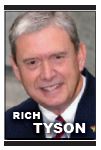By Richard Tyson
I was 10 years old when my father, a U.S. Air Force captain, was stationed in Japan at Tachikawa Air Base in 1960. When our family arrived there, we lived in a small village called Kunitachi, some distance from the base. I was a fourth-grader and was immediately enrolled in the American grade school located on the base.
Living off-base and going to school on-base provided a logistical challenge. Most days, my dad could drop me off in the morning at school, but my school days always ended before he could leave work, so I had to find my own way home.
My parents came up with a solution: I would take the bus from school to Tachikawa station, catch the train to Kunitachi station and walk home from there. At first, my folks were a bit nervous about this idea. They rode the train with me several times to be sure I understood the process. It wasn’t long, however, before I could successfully undertake this daily adventure on my own.
The train ride was pretty simple: There was only one stop between Tachikawa and Kunitachi stations. However, the train was slow; usually the trip took around 45 minutes. My mother suggested that I pass the time reading. Then and now, I love to read, so I was quick to agree.
For several weeks, the system worked flawlessly. My parents quit worrying, and so did I. And that’s where things got dicey.
One winter afternoon, I was deeply absorbed in reading. When I finally looked up from the pages of my book, I realized that the train had just stopped at a station that I didn’t recognize. It only took me a few seconds to realize that I had missed my stop at Kunitachi. I didn’t know what to do, so I froze. Several more station stops were made before I recognized the name of an upcoming station: Tokyo.
I then realized that the train was heading into the Tokyo metroplex. The farther we went toward what was then the most populous city in the world, more and more people crowded onto the train. I spoke virtually no Japanese and I was clueless as to what to do. Scared to death, I buried my head in my hands and started to cry.
It was in this moment of despair that I felt a hand touch my shoulder. I looked up into the eyes of a young Japanese man. In somewhat halting English, he asked if he could help me. I sobbed out my plight. He then smiled and said, “I will get you home.”
At the next station, my rescuer ushered me off the train and led me to the opposite platform where we soon caught a train going back toward Kunitachi. When we arrived there, he asked if I could find my way from the station to my home. I assured him that I knew the way and we parted.
I don’t know this young man’s name, but I do remember his gentle smile and willing sacrifice of his time for me. He said that he was grateful that I had provided him the opportunity to practice his English. Of course, I felt that he had saved my life! Today, nearly 60 years later, I still remember my visceral sense of hopelessness and terror.
My experience as a frightened little boy was a pivotal moment in my life. Today, having an adult perspective on the incident, I realize that my rescuer was probably around 25 years old. That means that he was probably a scared 10-year-old himself when American bombs were falling on his country late in World War II. It would have been so easy, not even 15 years later, for him to ignore a distraught little American boy and not reach out to help. Instead, he showed compassion for me.
The great lesson here is so simple: We are all part of the same human family. Yet for some reason, this seems to often elude us. We define ourselves as Americans or Japanese, or any of the world’s 195 sovereign nations. We see one another as black, white, brown or yellow. We are liberals or conservatives, Republicans or Democrats. We see the world through what makes us different, rather than what unites us. We calcify ourselves into our conflicting positions rather than our common interests. And these positions inevitably cause us to contend with one another and to become blind to our opportunities to help — or even rescue — each other.
In this extraordinary season of disease, civil unrest and political polarity, perhaps we have a special opportunity to see one another differently, to recognize our common humanity and to lift and sustain one another.
As a coach for many years to CEOs and business leaders, I have stressed the importance of sustaining those who work for us. This necessarily entails seeing them not as just cogs in our corporate machines, but as human beings with their own struggles, challenges and opportunities. This requires a new type of judgment, one that is more facilitative than demanding.
There will be those who dismiss this counsel as foolish naivete, but I have seen it bear fruit, not only in business, but in families and communities. I believe that this simple desire to lift and sustain one another can be truly transformative, especially in these challenging times. We can reach out to one another with an encouraging and helping hand. We may have to do this wearing a mask with six feet between us — or perhaps even electronically — but like my Japanese rescuer, we can get one another safely home.
Richard Tyson is the founder, principal owner and president of CEObuilder, which provides forums for consulting and coaching to executives in small businesses.








